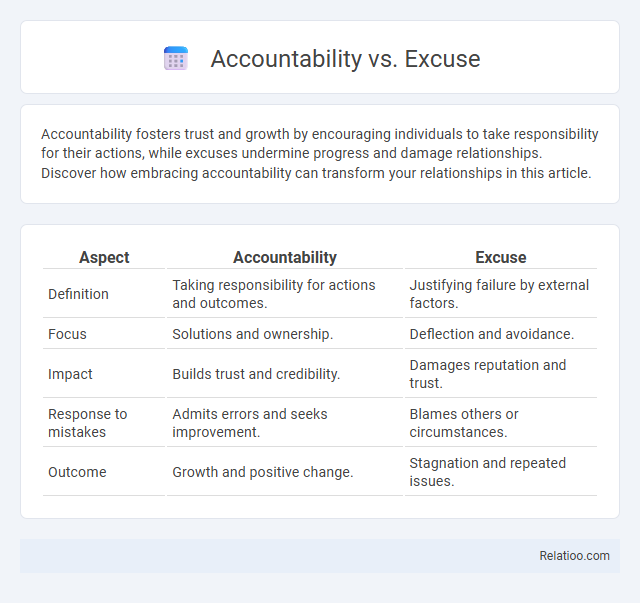Accountability fosters trust and growth by encouraging individuals to take responsibility for their actions, while excuses undermine progress and damage relationships. Discover how embracing accountability can transform your relationships in this article.
Table of Comparison
| Aspect | Accountability | Excuse |
|---|---|---|
| Definition | Taking responsibility for actions and outcomes. | Justifying failure by external factors. |
| Focus | Solutions and ownership. | Deflection and avoidance. |
| Impact | Builds trust and credibility. | Damages reputation and trust. |
| Response to mistakes | Admits errors and seeks improvement. | Blames others or circumstances. |
| Outcome | Growth and positive change. | Stagnation and repeated issues. |
Understanding Accountability: Definition and Importance
Accountability involves taking responsibility for one's actions and their outcomes, fostering trust and integrity in both personal and professional relationships. Understanding accountability is crucial for effective leadership, as it encourages ownership and proactive problem-solving rather than evading blame through excuses or passive suffering. Emphasizing accountability promotes growth, empowers decision-making, and strengthens commitment to goals and ethical standards.
What Constitutes an Excuse? Key Characteristics
An excuse is characterized by deflecting responsibility and providing justifications that avoid accountability for actions or outcomes. Key traits include minimizing personal role in the situation, shifting blame to external factors, and a tendency to evade corrective measures. Excuses often lack constructive intention, serving more to protect ego than to address issues effectively.
The Psychology Behind Accountability
Understanding the psychology behind accountability reveals its crucial role in personal growth and emotional resilience. Accountability encourages you to take responsibility for actions, fostering a mindset that prioritizes learning from mistakes rather than making excuses or succumbing to suffering. This shift empowers your psychological well-being by promoting self-efficacy and reducing feelings of helplessness.
The Impact of Excuses on Personal Growth
Excuses hinder your personal growth by creating a barrier to accountability, preventing you from learning from mistakes and developing resilience. When excuses dominate your mindset, they shift focus away from solutions and foster a cycle of stagnation and self-pity. Embracing accountability instead of excuses empowers you to take control of your actions and unlocks pathways to meaningful self-improvement.
Accountability vs Excuse: Key Differences
Accountability requires owning your actions and outcomes, while excuses shift responsibility away from you, undermining growth and trust. Embracing accountability empowers you to learn from mistakes and make proactive changes, whereas excuses create barriers to progress and damage relationships. Understanding this key difference is essential for personal development and professional success.
The Role of Accountability in Leadership and Teams
Accountability in leadership fosters trust and drives performance by ensuring team members take ownership of their actions and outcomes. Unlike excuses, which undermine responsibility and impede progress, accountability encourages transparent communication and continuous improvement. Embracing accountability within teams enhances collaboration, strengthens commitment, and ultimately leads to more effective problem-solving and goal achievement.
How Excuses Undermine Success
Excuses create psychological barriers that prevent individuals from taking responsibility for their actions, effectively stalling personal and professional growth. By shifting blame to external factors, excuses undermine accountability, which is essential for learning from mistakes and implementing solutions. This mindset limits success by fostering a victim mentality and reducing motivation to overcome challenges.
Strategies to Foster Accountability Mindset
Developing an accountability mindset requires embracing ownership of your actions and decisions while learning from mistakes rather than making excuses. Strategies to foster this include setting clear goals, regularly reflecting on progress, and seeking feedback to identify areas for improvement. By cultivating self-awareness and committing to personal growth, you empower yourself to overcome challenges without resorting to suffering or blame.
Overcoming the Habit of Making Excuses
Overcoming the habit of making excuses requires embracing accountability by accepting responsibility for actions and outcomes, which fosters personal growth and resilience. Shifting focus from suffering or external blame to actionable solutions empowers individuals to break free from negative patterns and develop proactive problem-solving skills. Consistent practice of accountability transforms challenges into opportunities, reducing excuse-making and promoting a success-oriented mindset.
Real-Life Examples: Accountability Triumphs Over Excuses
Taking accountability in real-life situations often leads to personal growth and improved outcomes, unlike excuses that hinder progress and mask responsibility. For example, employees who own mistakes at work typically gain trust and find solutions faster, while those offering excuses may face stalled careers or strained relationships. By embracing accountability, Your ability to overcome challenges and achieve lasting success strengthens considerably.

Infographic: Accountability vs Excuse
 relatioo.com
relatioo.com